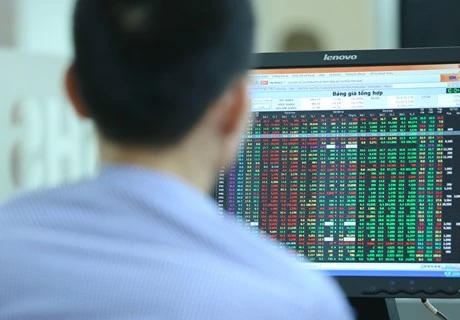 Over the past 20 years, the Vietnamese stock market has been stabilised and proven its role in national economic development. (Photo: VNA)
Over the past 20 years, the Vietnamese stock market has been stabilised and proven its role in national economic development. (Photo: VNA) Hanoi (VNA) - The State Securities Commission was established on November 28, 1996 in line with Decree No. 75/1996/ND-CP of the Government. The Ho Chi Minh City Securities Trading Centre was formed in accordance with a decision dated July 11, 1998.
Vietnam’s first securities trading centre was put into operation two years later and the first transaction was conducted on July 28, 2000 with two codes, marking a historic turning-point in the domestic stock market.
The Hanoi Securities Trading Centre (HASTC) (now Hanoi Stock Exchange), which debuted in March 2005, has also contributed to the formation and development of the Vietnamese stock market.
Over the past 20 years, the Vietnamese stock market has been stabilised and proven its role in national economic development.
Important capital mobilisation channel of the national economy
Minister of Finance Dinh Tien Dung affirmed that the securities market has served as a mid- and long-term capital mobilisation channel of the national economy, contributing to perfecting the financial market and the market economy.
“The operation of the securities market has demonstrated the sound leadership of the Party and the market-based, State-regulated economic development, with a combination of capital and banking credit markets,” Dinh Tien Dung said.
Balancing point of the financial system
Chairman of the State Securities Commission Tran Van Dung said in 2000 that most of the capital of businesses were sourced from banks, which led to debt-to-GDP at 40 percent. Since the inception of the stock market, capital mobilised for the national economy increased from 40 trillion VND (1.7 billion USD) in 2006 to 320 trillion VND in 2019.
The stock market grew 50 percent annually over the past two decades, with stock market capitalisation reaching 5.5 quadrillion VND and market capitalisation to GDP expanding from 0.3 percent in 2000 to 104 percent in June 2020.
Dr. Can Van Luc, an expert of the Bank for Investment and Development of Vietnam (BIDV) and a member of the National Council for Financial and Monetary Policy Consultation, said despite difficulties caused by COVID-19, total capital mobilised for the national economy still hit 107 trillion VND in the first half of this year. The rate of social investments channeled through the market was estimated at 16.5 percent each year during the 2016-2019 period.
The stock market is an important capital mobilisation channel of the national economy, contributing to perfecting the financial market and the market economy.
There are more than 1,600 businesses listed on Vietnam’s two exchanges, with a large amount of capital mobilised in the stock market to serve production and business activities.
The Government has also raised a huge amount of capital through the issuance of Government bonds for socio-economic development.
Thanks to the growth of the stock market, banks have mobilised over 252 trillion VND through the issuance of shares since 2005, helping the commercial banking system increase its total charter capital from 20.6 trillion VND to about 272 trillion VND.
In addition, the stock market has indirectly provided capital for the national economy in the context of limited capital from commercial banks due to the restructuring of organisations.
“The robust development of the securities market has helped to restructure Vietnam’s financial system towards more balance and sustainability. It is estimated that the stock market capitalisation ratio in the financial system now stands at 30.6 percent, as compared with the ratio of 68.7 percent of credit organisations and 2010’s 21 percent,” Tran Van Dung said.
Creating momentum for the private economic sector
In the monetary market, credit growth posted by commercial banks has begun to decrease in recent years as focus has been paid to short-term loan grants. In that context, the stock market has played the role of providing medium and long-term capital for the national economy.
“Notably, the stock market has helped the private economic sector to grow further. In fact, many firms have developed fruitfully after equitisation,” Tran Van Dung said.
Tran Van Dung cited the Vietnam Dairy Products JSC (Vinamilk) as an example, saying the company’s State capital was only about 100 million USD before equitisation. However, its market capitalisation reached billions of dollars after equitisation.
He stressed that Vinamilk’s social contributions are beyond these simple numbers.
Another example is the real estate conglomerate Vingroup that has mobilised billions of dollars through the stock market.
Currently, the private economic sector contributes most to the national gross domestic product (GDP) (43 percent), and is expected to serve as the main monument in the time ahead.
Tran Van Dung highlighted the increasingly important role of private enterprises to national socio-economic development.
About a decade ago, there was only one member in the one-billion-USD club, he said. The number is 27 at present. The private economic sector has contributed most to the national domestic product (GDP) (43 percent), and is expected to serve as the main momentum in the time ahead.
It is noteworthy that in the private economic sector, the businesses listed in the stock market have served as the driving force.
Regarding development orientations of the domestic stock market in the time ahead, Minister Dinh Tien Dung said the market is set to modernise with diverse products of regional and international standards.
The financial sector aims to turn the Vietnamese stock market into one of the financial centres of Southeast Asia and Asia at large.
“The Vietnamese stock market is expected to continue to develop intensively and sustainably, bringing into full play its role as the driver of the national economy. The new Law on Securities will take effect in early 2021, which, together with the establishment of the Vietnam Stock Exchange and cutting-edge IT, has created a good foundation for the country to develop into one of the regional financial centres,” he said./.

























